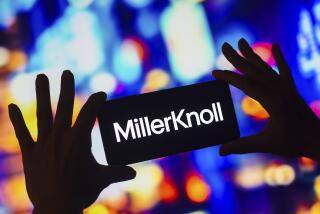Critics of Jakks Go to the Mat
- Share via
For Jakks Pacific Inc., the fun and games have come to a halt -- at least for now.
First it was surprisingly lower earnings, followed by a pummeling of its shares by investors.
Now, the Malibu-based company -- best known for its World Wrestling Entertainment action figures -- is coming under fire for financial transactions and a new bonus plan that analysts say could create a windfall for senior managers who are already well compensated.
“If they performed, and shareholders were making money, it’s one thing for management to also make a lot of money,” said Arvind Bhatia, an analyst with Southwest Securities in Dallas, who downgraded the company to “neutral” Wednesday, the day after Jakks reported a 60% drop in quarterly profit. “But shareholders are losing money, and management is making a lot of money.”
Criticized for a bonus system that one corporate-governance expert called “extremely rare,” Jakks executives announced this year that they would change the system.
Starting Jan. 1, cash bonuses will be based on growth in earnings per share, and senior executives will get stock grants for achieving pretax income benchmarks.
That system is relatively common. But when Chief Executive Jack Friedman announced in February that the company would adopt it, he didn’t provide any details about the formula -- exactly how, for example, 2004 bonuses would be tied to what level of growth.
Frustrated analysts said the ambiguity left them at a loss: Without knowing the formula, how would they be able to discern this year whether Jakks’ executives were making decisions based on shareholders’ best interests or their own?
Part of their concern stems from how Jakks has financed acquisitions. Last year, to raise money for purchases, the company sold stock, which diluted shareholder value -- but didn’t affect pretax profit, the basis for setting top managers’ bonuses.
Jakks executives declined to comment on the new bonus plan or address analysts’ concerns.
As it stands, if earnings decline, so do the bonus checks for Jakks executives. But at the same time, lousy results now mean that achieving earnings growth later becomes that much easier. The base is lower.
“It’s frustrating for investors not to know the terms well enough to know whether next year’s gain would offset this year’s shortfall in pay,” said Sean McGowan, a toy industry analyst with Harris Nesbitt Gerard in New York, who downgraded the firm Wednesday to “underperform.”
Friedman and Stephen Berman, the chief operating officer, have been at the helm of Jakks since the company’s inception.
The company’s fortunes grew steadily after its founding in 1995, reaching sales of $310 million last year. But the profit uptick began to slow in 2000, as the company’s strategy of growth-by-acquisition bumped up against the difficulties of integrating new companies with Jakks’ mainstays.
Last year, net income was $31.3 million, up from $28.2 million a year earlier. But because of a stock offering that increased the number of shares outstanding, earnings per share fell to $1.37 from $1.45.
If bonuses had been tied to a per-share growth target -- as they will be starting next year -- Friedman and Berman probably wouldn’t have been rewarded in 2002. Under the existing system, they each received bonuses of 4% of the company’s pretax profit, or almost $1.43 million.
Although many companies consider pretax profit in figuring bonuses, a bonus is usually a reward for meeting a targeted profit goal, not a piece of the total pretax profit pie, according to Paul Hodgson, senior research analyst with Corporate Library, a corporate-governance information service. The straight percentage method is used by only two companies in the Standard & Poor’s 500 index, Hodgson said. Jakks caps the 4% bonus at $2 million.
“While profit may be a common target, using a specific percentage of profits to fund bonuses for executives is extremely rare,” Hodgson said.
What’s more, Hodgson added, Friedman and Berman enjoy unusual protections for their bonuses. Most companies give shareholders an ostensible say by allowing them to vote on bonus plans; Jakks guarantees its top managers bonuses by writing them into the executives’ contracts -- which don’t require shareholder approval.
Last year, in addition to the bonuses, Jakks’ top two executives reaped rewards from the stock offering: Friedman took home close to $4 million, said Lon Gerber, the director of insider research for Thomson Financial, while Berman netted more than $1.7 million. The total net gain to company insiders was more than $6 million.
Shortly after the sale, Jakks lowered its earnings outlook for the year. The stock, worth $17.75 at the time of the equities sale in July 2002, fell to $12.97 after the outlook was lowered. It closed at $11.53 on Friday on Nasdaq, down 35% from last July.
This year, Jakks sold debt shortly before revising its earnings outlook. It finalized the sale of $98 million of convertible notes in June, less than three weeks before the end of the second quarter, saying it needed the money to finance potential acquisitions.
Then, last week, Jakks reported sharply lower-than-expected earnings and said profit would be flat for the full year.
On a conference call, Friedman said the company hadn’t known at the time of the debt offering that bad weather and other factors had negatively affected sales.
In a report last week, Bear Stearns & Co analyst Joseph Yurman wrote that while “we are not suggesting that management would act unethically, we are even more troubled by the fact that the company was marketing a $98-million convertible bond offering in early June if such a dramatic miss was even a remote possibility.”
Bear Stearns acted as lead manager on the offering.
“We harbor strong doubts about this team’s ability or willingness to explain their company to the Street,” Yurman said.
“According to management, they have ‘pretty good’ internal controls, they discussed matters at ‘high levels’ and also with their outside securities counsel, yet still decided not to” warn about the pending earnings shortfall.
*
(BEGIN TEXT OF INFOBOX)
Key Events
1995: Jakks Pacific incorporates.
1996: Goes public.
1997: Acquires die-cast vehicle makers Remco and Road Champs.
1999: Buys Berk Corp. and Flying Colors Toys. Purchases specialty pen maker Pentech International.
2001: Buys Kids Biz.
2002: Sells $62 million in common stock. Cuts revenue projections.
April 2003: Shares drop 6% because profit is lower than analysts’ expectations.
June: Announces a controversial sale of $80 million in convertible notes.
Tuesday: Reports second-quarter profit plummeted 60%.
*
Sources: Jakks Pacific, Mergent,
Times research Los Angeles Times
More to Read
Inside the business of entertainment
The Wide Shot brings you news, analysis and insights on everything from streaming wars to production — and what it all means for the future.
You may occasionally receive promotional content from the Los Angeles Times.










